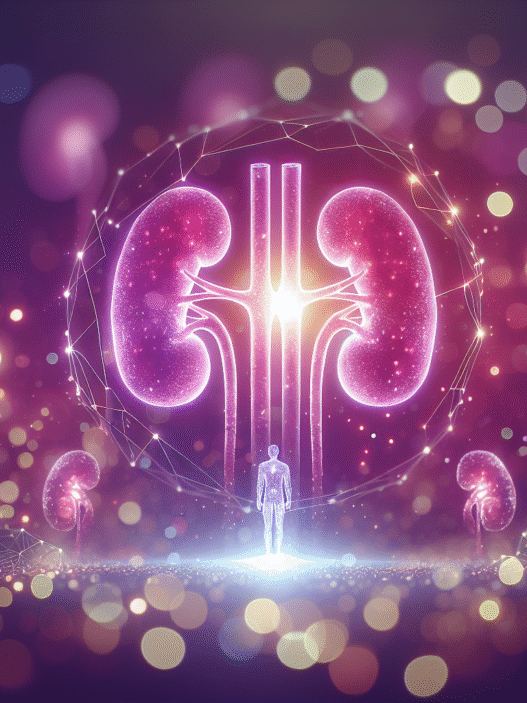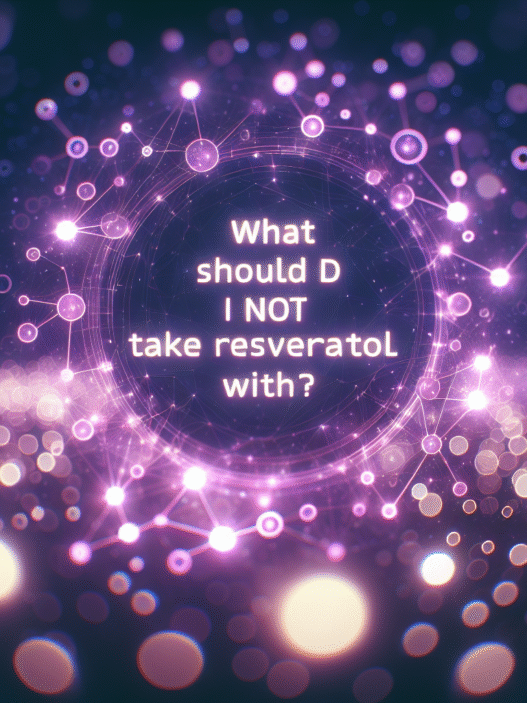Understanding Resveratrol
Resveratrol is a natural compound found in various plants, particularly in the skins of grapes and berries. Its potential health benefits have sparked interest among those focused on holistic wellness. This section will examine resveratrol’s impact on ovary health and lung function.
Role in Ovary Health
Research indicates that resveratrol plays a significant role in maintaining ovary health. It helps improve glucose homeostasis by activating sirtuins, proteins that regulate metabolism in insulin-target organs. This action may aid in managing insulin resistance, which can be beneficial for overall reproductive health.
Additionally, resveratrol may influence cholesterol levels and decrease the oxidation of “bad” LDL cholesterol. Studies have shown that grape extract enriched with resveratrol leads to reductions in LDL cholesterol and oxidized LDL, which can have a positive effect on cardiovascular health as well (Healthline).
The compound also demonstrates powerful antioxidant properties. It acts as a radical scavenger and is capable of chelating metal ions, ultimately contributing to the protection of various cellular functions.
| Benefit | Description |
|---|---|
| Improves Glucose Homeostasis | Aids in managing insulin resistance. |
| Reduces LDL Cholesterol | Can help lower oxidation of bad cholesterol. |
| Antioxidant Properties | Protects cells from oxidative stress. |
Impact on Lung Function
In addition to its effects on ovary health, resveratrol is noted for its positive impact on lung function. Research suggests that it may aid in improving lung health, potentially by reducing inflammation in the respiratory system. The compound’s antioxidant capabilities may help combat oxidative damage caused by environmental pollutants and respiratory conditions.
Moreover, resveratrol may slow blood clotting, leading to increased caution when used alongside anticoagulant medications. This interaction may heighten the risk of bruising and bleeding (WebMD).
Natural sources of resveratrol include grapes, wine, blueberries, cranberries, pomegranates, and their juices. Additionally, it is readily available in supplement form, which often provides higher doses than what one typically consumes through food.
| Area of Impact | Benefit Description |
|---|---|
| Lung Function | May improve respiratory health and reduce inflammation. |
| Blood Clotting | Potentially slows blood clotting, requiring monitoring with certain medications. |
As natural health enthusiasts explore the potential advantages of including resveratrol in their wellness routines, it remains crucial to look into its various health effects. With appropriate understanding, one can assess if it is okay to take resveratrol every day?.
Resveratrol and Health Conditions
Resveratrol has garnered attention for its potential positive effects on various health conditions. Understanding these benefits can help individuals determine if “is it okay to take resveratrol every day?” fits into their wellness routine.
Benefits for Glucose Homeostasis
Research indicates that resveratrol plays a role in enhancing glucose homeostasis by improving insulin sensitivity. It activates sirtuin, a protein that helps regulate metabolism in insulin-target organs, leading to better management of blood sugar levels. This can be particularly beneficial for individuals struggling with insulin resistance or people at risk of developing type 2 diabetes (Medical News Today).
Effects on Blood Pressure
A review conducted in 2015 found that resveratrol supplementation at doses of 150 milligrams or more effectively lowered systolic blood pressure. However, it showed no significant effects on diastolic blood pressure. For individuals monitoring their cardiovascular health, this could be a compelling reason to consider incorporating resveratrol into their daily regimen.
| Study Finding | Systolic Blood Pressure | Diastolic Blood Pressure |
|---|---|---|
| Resveratrol Dosage | Lowered | No significant change |
| Minimum Effective Dose | 150 mg+ | – |
Improvement in Renal Function
Resveratrol supplementation has been indicated to mildly improve renal function among the general adult population. This suggests that it could play a supportive role in kidney health, making it a potential option for those seeking to enhance their overall well-being (PubMed).
Effects on Inflammation and Oxidative Stress
In patients with type 2 diabetes, resveratrol supplementation has been observed to improve oxidative stress and markers of inflammation. Managing inflammation is critical, as it underlies many chronic health issues. By potentially alleviating these factors, resveratrol may contribute to better health outcomes for individuals dealing with chronic conditions (PubMed).
For further insights into the specific benefits of resveratrol, readers can explore our article on what are the benefits of taking resveratrol? and delve into how it impacts other aspects of health like blood pressure, kidney function, and more.
Resveratrol Dosage and Safety
Understanding the appropriate usage and safety of resveratrol is essential for individuals interested in incorporating this compound into their wellness routine. This section will discuss recommended dosages, potential side effects, and possible drug interactions.
Recommended Dosages
Clinical studies show that it is technically safe to take resveratrol in doses up to 5 grams (g) per day. However, there is a consensus that exceeding 2.5 g per day may lead to gastrointestinal side effects such as cramping, flatulence, and nausea (Medical News Today). Daily doses of 150 milligrams or more have been shown to effectively lower systolic blood pressure. Despite these findings, the actual dosage in most supplements generally ranges from 250 to 500 milligrams, necessitating higher intake levels for therapeutic benefits.
Here’s a summary table of recommended dosages:
| Dosage Range | Effects |
|---|---|
| 150 mg+ | Lowers systolic blood pressure |
| 250 – 500 mg | Common supplement dosage |
| Up to 2.5 g | Generally safe but may cause mild side effects |
| Up to 5 g | Technically safe but caution advised |
Potential Side Effects
While resveratrol is well-tolerated by many, some may experience mild side effects, particularly at higher dosages. Common adverse events reported include:
- Gastrointestinal symptoms (cramping, flatulence, nausea)
- Allergic reactions (especially in individuals with grape or wine allergies)
Although severe side effects have not been observed in studies, it’s advisable for individuals with underlying health conditions such as bleeding disorders to consult a healthcare professional before starting resveratrol. For additional details, see our article on what are the negative side effects of resveratrol?.
Drug Interactions
Resveratrol may interact with certain medications, impacting their effectiveness. It is essential to be cautious about what other supplements or medications are being taken alongside resveratrol. Individuals should consult healthcare providers regarding potential interactions before starting this supplement. For instance, those taking medications that affect blood clotting should pay particular attention, as resveratrol could possibly enhance the effects of these drugs.
For further information regarding what substances to avoid while taking resveratrol, check our article on what should I not take resveratrol with?.
By being informed about the appropriate dosages, potential side effects, and possible drug interactions, individuals can make better choices about incorporating resveratrol into their daily wellness routines and consider the question, is it okay to take resveratrol every day?.
Resveratrol Sources and Forms
Resveratrol is a popular compound known for its potential health benefits, especially among those interested in anti-aging and holistic wellness. It can be consumed from natural food sources or found in supplement form.
Natural Sources of Resveratrol
Natural sources of resveratrol include a variety of fruits and beverages. The following table summarizes some of the most common natural sources:
| Source | Resveratrol Content (mg per serving) |
|---|---|
| Red Grapes | 0.3 – 1.0 |
| Red Wine | 0.2 – 5.0 (per 5 oz) |
| Blueberries | 0.1 – 0.3 |
| Cranberries | 0.1 – 0.2 |
| Pomegranates | 0.1 – 0.5 |
| Peanuts | 0.01 – 0.3 |
| Japanese Knotweed | 0.1 – 2.0 |
Resveratrol can be primarily found in grapes, which are often recognized for their antioxidant properties. Both grapes and their juice, as well as red wine made from them, are considered excellent sources. Other fruits like blueberries and cranberries also contribute smaller amounts. These natural foods not only provide resveratrol but also offer additional nutrients beneficial for health. For more details on these effects, refer to what are the benefits of taking resveratrol?.
Supplement Availability
Resveratrol is widely available in supplement form, being particularly popular among those seeking higher doses than can be obtained from food alone. Most supplements contain between 250 to 500 milligrams of resveratrol. However, research suggests that effective doses may be significantly higher, often requiring 2 grams (2,000 milligrams) or more daily to match the amounts used in studies (WebMD).
Supplements can come in various forms, including capsules, powders, and liquid extracts. These forms are typically designed for easy ingestion and absorption. Since not all resveratrol supplements are created equal, it’s essential to choose products from reputable brands to ensure quality and efficacy. Individuals should also consider if they have any contraindications regarding supplement use by checking articles like what should I not take resveratrol with?.
By incorporating natural sources of resveratrol into one’s diet or considering supplements, individuals can potentially harness its benefits for their wellness routine. However, it’s important to consult with a healthcare professional to determine the best approach tailored to personal health needs. For those curious about the effects of taking resveratrol daily, additional insights can be found in the article titled is it okay to take resveratrol every day?.
Resveratrol and Disease Prevention
Resveratrol is often highlighted for its potential in disease prevention, encapsulating a variety of health benefits that may contribute to life longevity and wellness. Here, we explore its anti-aging properties, effects on brain health, and cardiovascular benefits.
Anti-Aging Properties
Resveratrol is known for its ability to extend lifespan in various animal studies by activating genes associated with aging diseases, similar to the effects seen with calorie restriction (Healthline). The exact impact of resveratrol on human lifespan remains unverified, but its antioxidant and anti-inflammatory properties suggest it might combat aging markers at the cellular level.
Potential effects of resveratrol on aging include:
- Activation of sirtuins, proteins linked to longevity.
- Reduction in cellular inflammation.
- Protection against age-related diseases, including diabetes and heart disease.
These properties lead many to wonder, is it okay to take resveratrol every day? The daily consumption of resveratrol can potentially offer sustained benefits in supporting healthy aging.
Effects on Brain Health
Resveratrol’s neuroprotective qualities make it a notable contender in supporting brain health. Research indicates that it may aid in improving memory and cognition by enhancing blood flow and reducing inflammation in the brain. Some key benefits include:
| Benefit | Description |
|---|---|
| Antioxidant Effects | Protects brain cells from oxidative damage. |
| Improved Blood Flow | Enhances circulation, aiding cognitive functions. |
| Reduced Inflammation | Mitigates factors contributing to neurodegenerative conditions. |
Additionally, its positive effects on glucose homeostasis can also be beneficial for individuals at risk of diabetes, further highlighting its relevance in neuroprotective strategies.
Cardiovascular Benefits
Resveratrol may significantly contribute to heart health by positively influencing lipid profiles and blood pressure. Its capabilities include:
- Modulating cholesterol levels, particularly reducing “bad” LDL cholesterol and its oxidation.
- Improving endothelial function, which is vital for cardiovascular health.
- Potentially lowering blood pressure through improved blood vessel function.
These benefits underscore resveratrol’s role in preventing cardiovascular diseases. For those interested in how resveratrol fits into a holistic wellness routine, checking for delicious ways to incorporate it from the food sources richest in resveratrol might provide additional insights.
In summary, resveratrol is emerging as a promising component in the pursuit of disease prevention, with an assortment of benefits for aging, brain function, and heart health. As ongoing research unfolds, its role in everyday health practices continues to be of great interest.
Resveratrol Studies and Research
Research into resveratrol has gained significant interest due to its potential health benefits, particularly in the areas of anti-aging and chronic disease management. This section examines clinical trials on its efficacy, bioavailability and pharmacokinetics, as well as any associated toxicity and side effects.
Clinical Trials on Efficacy
Clinical trials have provided insight into the effectiveness of resveratrol for various health conditions. Notable findings include:
- In patients with type 2 diabetes, resveratrol supplementation improved oxidative stress and markers of inflammation.
- A double-blind, randomized controlled trial showed resveratrol might enhance hepatic steatosis and cardiovascular indices in overweight individuals with type 2 diabetes (BMC Cardiovasc Disord).
- Resveratrol has been widely studied for its potential in cancer prevention and treatment, exhibiting the ability to inhibit all carcinogenesis stages (NCBI).
Bioavailability and Pharmacokinetics
Understanding how resveratrol is absorbed and metabolized is vital for evaluating its effectiveness:
- Resveratrol is rapidly metabolized in the liver into glucuronide and sulfate forms and is affected by hydrogenation in the intestine.
- Factors such as pH, temperature, and interactions with transporters and enzymes greatly influence its absorption and stability. Its metabolism can produce various metabolites with differing biological activities, impacting both efficacy and potential side effects (NCBI).
Toxicity and Side Effects
While resveratrol is generally considered safe, potential risks should be acknowledged:
- Side effects are more likely to occur at doses of 2.5 grams (g) or more daily, which can cause pro-oxidant effects, cellular DNA damage, and increased oxidative stress. High doses may inhibit enzyme activity that affects bioavailability and can raise bleeding risk when combined with anticoagulants.
- No severe side effects have been identified with resveratrol use, even at high doses. However, individuals allergic to grapes or wine, or those with specific health issues like bleeding disorders, should consult a doctor before considering resveratrol supplementation.
Further investigation will continue to clarify the potential of resveratrol in enhancing health and wellness as well as its safe usage guidelines. For insights into its benefits, refer to our article on what are the benefits of taking resveratrol?.





















